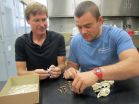(Press-News.org) About one-third of patients admitted to an intensive care unit (ICU) will develop delirium, a condition that lengthens hospital stays and substantially increases one's risk of dying in the hospital, according to a new study led by Johns Hopkins Medicine researchers appearing in the British Medical Journal.
"Every patient who develops delirium will on average remain in the hospital at least one day longer," says one of the study's authors, Robert Stevens, M.D., a specialist in critical care and an associate professor at the Johns Hopkins University School of Medicine. Worse, "if you're admitted to the intensive care unit and you develop brain dysfunction, your risk of not surviving your hospital stay is doubled."
Physicians and nurses working in intensive care have long been aware that a significant percentage of their patients develop delirium, a type of brain dysfunction characterized by a sudden onset, fluctuating symptoms, inattention and confusion. However, this study establishes the most definitive link between delirium in the ICU and poor outcomes.
Stevens led an interdisciplinary team of colleagues who sifted through 10,000 published reports before selecting 42 studies that met their specific criteria. For instance, they weeded out any studies that included patients with head injuries, strokes or other neurological disorders to obtain a more precise estimate of delirium in ICU patients. That left Stevens and his team with 16,595 patients, of which 5,280 -- or 32 percent -- had confirmed cases of delirium as measured by established screening protocols. They conducted a meta-analysis, which found that delirium was associated with a twofold increase in hospital mortality even after adjusting for severity of illness.
One of the best known causes of delirium is medications given to ICU patients, such as sedatives. For instance, benzodiazepine, which is commonly administered to patients to help them calm down and sleep, may paradoxically lead to disorientation and confusion. The goal moving forward, Stevens says, should be to reduce or eliminate the use of such potentially harmful medications, particularly among higher risk populations, such as the elderly and individuals with dementia. Nighttime interruptions should also be kept to a minimum to ensure that patients get a good night's rest without sedatives.
Other causes of delirium, however, might be harder to address. According to the inflammatory hypothesis, illnesses occurring outside the brain, such as severe pneumonia, can lead secondarily to inflammation in the brain. Another theory posits that delirium is linked to changes in the flow of blood to the brain, sometimes resulting in strokes that are not recognized as such. Intriguingly, Stevens' review also showed that among patients who develop delirium, the risk of long-term cognitive decline increases by 20 to 30 percent.
"We're seeing that even though you may have a very severe illness or injury and you're lucky enough to survive, you're still not quite out of the woods," Stevens says. "We need to think about the measures we can put into place to decrease these long-term burdens."
INFORMATION:
Additional Johns Hopkins researchers include Han Wang, Eric B. Schneider, Neeraja Nagaraja and Gayane Yenokyan.
Media contacts:
Marin Hedin, (410) 502-9429, mhedin2@jhmi.edu,
Helen Jones, (410) 502-9422, hjones49@jhmi.edu
[EMBARGOED UNTIL THURSDAY, JUNE 4] Although treatment advances have dramatically reduced deaths from opportunistic infections related to AIDS, a new study drawing on 30 years of data from more than 20,000 patients in San Francisco suggests there is still ample room to improve. About a third--35 percent--of AIDS patients diagnosed with their first opportunistic infection from 1997 to 2012 in that city died within five years, according to the study, published in the Journal of Infectious Diseases.
"While recent research suggests that many opportunistic infections in the ...
Philadelphia, PA, June 4, 2015 - Children with Autism Spectrum Disorder (ASD) are often picky eaters, which can lead parents to suspect that their children might not be getting adequate amounts of vitamins and minerals. This sometimes leads parents of children with ASD to try nutritional supplements and dietary regimens such as gluten-free and casein-free (GFCF) diets without professional supervision. In the largest study of its kind, published in the Journal of the Academy of Nutrition and Dietetics, researchers report that these well-intentioned efforts can result in ...
In a new study, scientists have gathered all available NASA/ESA Hubble Space Telescope data on the four outer moons of Pluto to analyse the system in more depth than ever before. The observations show that at least two of Pluto's moons are not neatly rotating on their axes but are in chaotic rotation while orbiting around Pluto and its companion Charon. The study also hints that one of the moons has a mysterious jet-black colouring. These surprising results appear in the 4 June issue of the journal Nature.
Almost every moon in the Solar System, including our moon, rotates ...
SALT LAKE CITY, June 4, 2015 - At times during the past 10,000 years, cottontails and hares reproduced like rabbits and their numbers surged when the El Niño weather pattern drenched the Pacific Coast with rain, according to a University of Utah analysis of 3,463 bunny bones.
The study of ancient rabbit populations at a Baja California site may help scientists better understand how mammals that range from the coast to the interior will respond to climate change, says anthropology doctoral student Isaac Hart. He is first author of the study to be published in the ...
A rare and elusive rabbit has been found, held and photographed by a researcher from the University of East Anglia (UEA).
The Annamite Striped rabbit, found in the forests of Laos and Vietnam, was first documented by rabbit expert Dr Diana Bell and colleagues from UEA's School of Biological Sciences in the journal Nature in 1999. It has rarely been seen since.
Researcher Sarah Woodfin, who is studying for a Masters in Applied Ecology and Conservation at UEA, set out on a three-month expedition to track the recently-discovered rabbit and study its habitat.
But she ...
Many aquatic species have a reputation for negligent parenting. Having cast their gametes to the currents, they abandon their offspring to their fate. However, hands-on parenting is taken to a whole new dimension in the Syngnathidae fish family. Instead of leaving the responsibility to the females, seahorse and pipefish males take the pledge to care for their young even before the eggs are fertilized. The females depart soon after placing their eggs directly into the male's brood pouch, leaving the soon-to-be fathers to incubate the developing embryos. Ines Braga Goncalves ...
Cancer has overtaken cardiovascular disease, which includes heart disease and stroke, as the UK's No 1 killer--but only among men, reveals research published online in the journal Heart.
Cardiovascular disease is still the most common cause of death among women, and kills more young women than breast cancer, the figures show.
The researchers used the latest nationally available data (2012-13) for each of the four UK countries and the Cardiovascular Disease Statistics 2014 report compiled for the British Heart Foundation (BHF) to quantify the prevalence of cardiovascular ...
Researchers have developed a score that predicts an individual's risk of dying within 5 years for people aged between 40 and 70 years old in the UK, according to new research published in The Lancet.
The score, which uses measures that can be obtained by simple questionnaires without any need for physical examination, such as self-rated health and usual walking speed, could be used by individuals to improve awareness of their health status, and by doctors to identify high-risk individuals for further treatment, say the authors.
Individuals can calculate their personalised ...
Women aged 50-69 years who attend mammography screening reduce their risk of dying from breast cancer by 40 per cent compared to women who are not screened - according to a major international review of the latest evidence on breast cancer screening.
Overall, women who are invited to attend mammography screening have a 23 per cent risk reduction in breast cancer death (owing to some attending and some not), compared with women not invited by routine screening programmes.
In the UK, this relative risk translates to around eight deaths prevented per 1,000 women regularly ...
ANN ARBOR, Mich. - Day in and day out, for years on end, millions of people with diabetes prick their fingers to test their blood sugar level. And many may wonder if all the careful eating, exercise and medication it takes to keep those levels under control is really worth it.
A major new study should encourage them to keep going for the long haul, to protect their hearts from diabetes-related damage. But it should also prompt them to work with their doctors on other ways to reduce their cardiovascular risk.
The key finding: that keeping blood sugar levels under good ...

